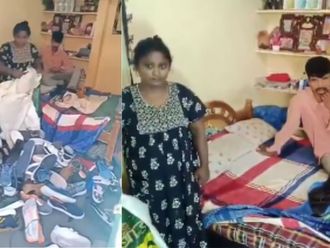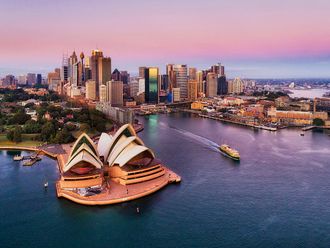
New Delhi: The debutantes from the batch of 2009 in Parliament are a heady mix of royalty, doctors, lawyers and actors. Among them is 34-year-old Shruti Choudhry, granddaughter of former Chief Minister of Haryana Choudhry Bansi Lal and daughter of Surender Singh and Kiran Choudhry.
The third generation politician is the Congress member from Bhiwani-Mahendragarh constituency of Haryana. The youngest of the 29 candidates who were in the fray from Haryana, it seemed an easy task for Shruti to win the elections, not because of her political background, but for being a recognisable face, from whom the electorate now has high hopes.
With grit and determination, she is geared up to bring about a change and with her optimistic dynamism desires to create a new order and reach out to the people who have stood by her family for the past several years.
Shruti speaks to Gulf News in an exclusive interview.
GULF NEWS: What made you join full-time politics even though you were a practicing lawyer?
SHRUTI CHOUDHRY: Yes, I practiced law, but now politics leaves no time for it. There was no conscious decision as such to enter politics. It just happened overnight. After my father died in 2005, during one prayer ritual my grandfather put the pagri (headgear) on my head in front of thousands of mourners. This in Haryana was quite unthinkable, as even now the state ranks as one of the highest in terms of female foeticide. And a pagri is put on the head of the male heir apparent. If the couple does not have a son, it is passed on to another male member of the extended family. So that incident was the turning point in my life and it was like stepping into my father's shoes.
Incidentally, my constituency is the biggest in Haryana and it's also the most backward in terms of water resources and other such issues. But since I have inherited my father's way of working and am similarly attached to people of my constituency, they too presume I am like him and have expectations. That's why I work doubly hard.
What new plans do you have for your constituency and the time frame you give yourself to fulfil those?
There is very little time. One year has already passed and out of the four left, the last will be all about preparations for the next elections. But yes, a lot of my National Highway projects have been sanctioned and I thank the Minister for Roads & Transport Kamal Nath for it. Then from Nabard (National Bank for Agriculture and Rural Development), I've had Rs1.6 billion sanctioned for one segment of the constituency, where the water table is extremely low. And with the time, I hope to take up some more big projects for my constituency.
Is there any particular project that's close to your heart?
I feel strongly about health care. Because in remote areas it's heartbreaking to see that if there's a small accident, people do not have medical facilities. My grandfather had a hospital constructed in Bhiwani for the disabled and at one time it was considered the largest in Asia. But today, it's not in good condition. Though fortunately the Chief Minister of Haryana, Bhupinder Singh Hooda, has given a cash package for the hospital, we need to do a lot more for the entire region. We need good infrastructure facilities for medical practitioners, because as things stand, many doctors do not want to work in the villages. There are several such issues that we face and we need to find solutions for these.
Despite wanting to make a mark, do you feel youngsters often get sidelined in Parliament and cannot raise issues, as the veterans hog all the attention? Any lessons the senior politicians can learn from their junior counterparts?
I feel humbled to hear this, though cannot say much. In politics, as in any field, experience has its own place. You can be young, dynamic and full of ideas, but there's no substitute for experience and I see this in every day of my life. But yes, it's disheartening when we go to Parliament prepared with questions, but things don't transpire as we want them. It happened with me twice that I went to speak on rural development and water resources issues, but couldn't do so because both times the session got adjourned. It was very frustrating.
Women, especially Sonia Gandhi, are attentive listeners and maintain their cool at most times. Isn't it the men who are mostly at loggerheads in Parliament?
Maybe! It could be because of the TV cameras, which are focused inside all the time. So a lot of it happens due to the live coverage.
If you were to change one thing about politics and politicians, what would it be?
One thing that's not nice is that politicians are not close to the people, whose elected representatives they are. No matter how far you reach in life, you can't afford to be cut off from people and become arrogant. There's no room for such behaviour in politics and I feel very strongly about it. The higher you go, the more humble you should be and set an example for others.
You mean politicians change after coming to power?
Yes, a lot of them lose sight of the fact that they are there because of the people. Moreover, political leaders should have the power to listen because the more you listen, the more aware you'll be. But if you only speak, you may not gather much. The capacity to listen and grasp, especially if it's different from your own point of view, must be paid attention to. Despite being surrounded by people most times, one should be able to analyse, because analysing is a constant mental exercise. And then be quick on the uptake to make decisions.
How's your equation with the younger generation politicians, especially Rahul Gandhi?
The younger lot across party lines are extremely bright and eager to make a difference to society. Rahul is my leader and inspires us all — whether it is his youth drive or galvanising the party workers.
What lessons has your mother, known more for her beauty than brains, taught you in the name and game of politics?
That's unfair on her. She's an extremely hard-working person and looks have nothing to do with it. There's only one way of being in public life and whether you look good or not, it's your hard work that pays off.
Has any particular instance from the political life of your family left an impression on your mind?
Growing up in a political family, from a very early age I began working with my father, who was in the Haryana Vikas Party. Since my mother was with the Congress Party, she could not campaign for him and being the only child, I used to go to his constituency and help him out. And then also help my mother here in Delhi. That's how my innings began in terms of public life.
What impacted my life the most was the way of functioning of my father. He wasn't just a politician, but a mass leader. And you can be that only when you are a very grass roots person and always on the go and mingle with people. He was like that. Extremely attached to people of his constituency, he was devoted to them and worked very honestly for their benefit. I'm trying to emulate him.
Oxford-educated lawyer
- Shruti Choudhry was born on October 3, 1975 in New Delhi to mother Kiran Choudhry and father Choudhry Surender Singh.
- She studied at the Convent of Jesus & Mary followed by Delhi Public School, R K Puram until 1993.
- Studied at Oxford- 1994.
- Graduated from Dayal Singh College, Delhi Univeristy - 1996.
- Received a degree in law from B R Ambedkar University, Agra - 1999.
- Practiced law and is associated with the law firm Karanjewala & Co.
- Entered active politics in 2009 by winning the Lok Sabha Elections.












